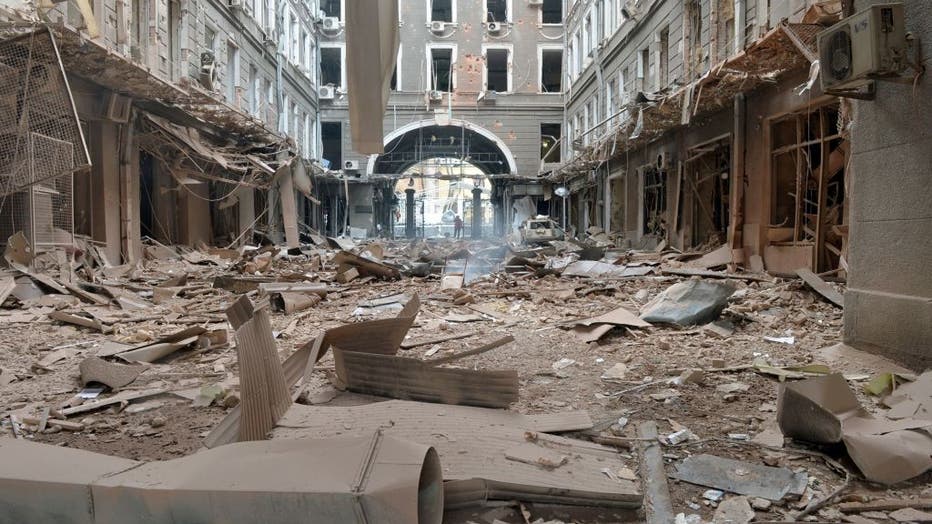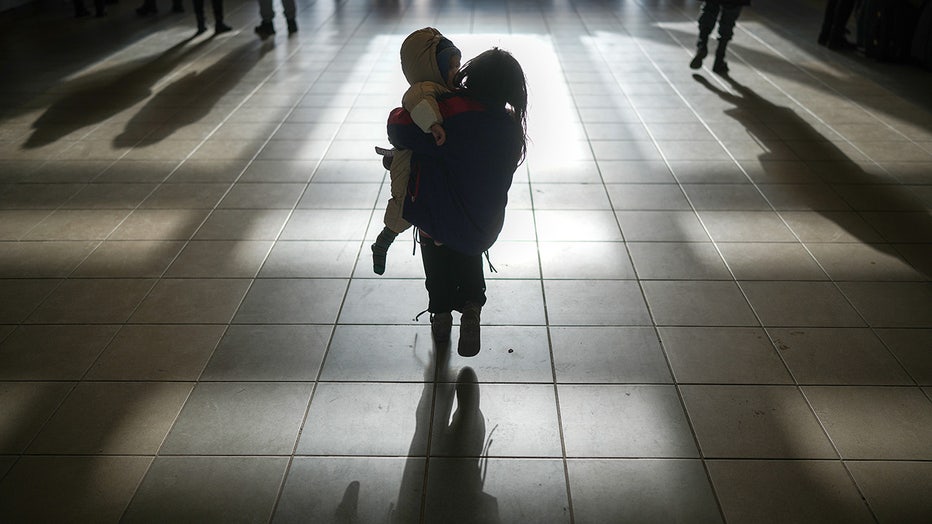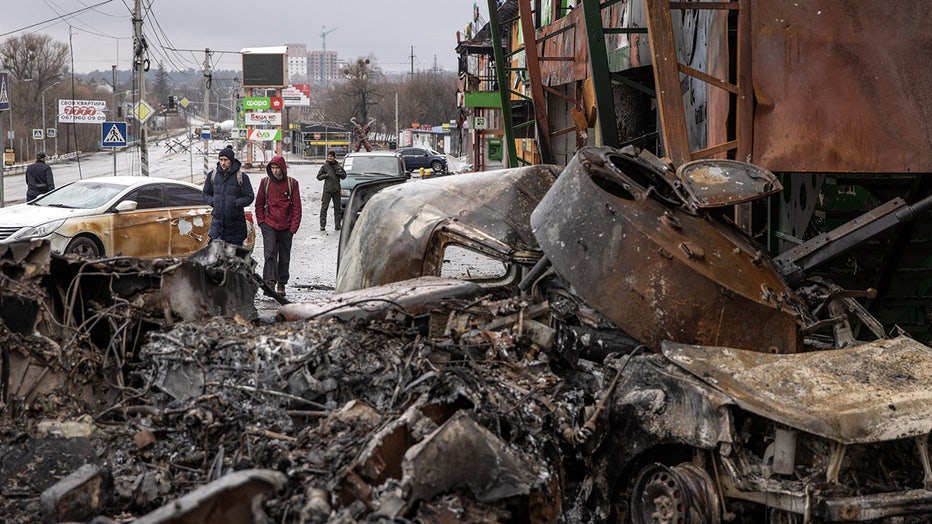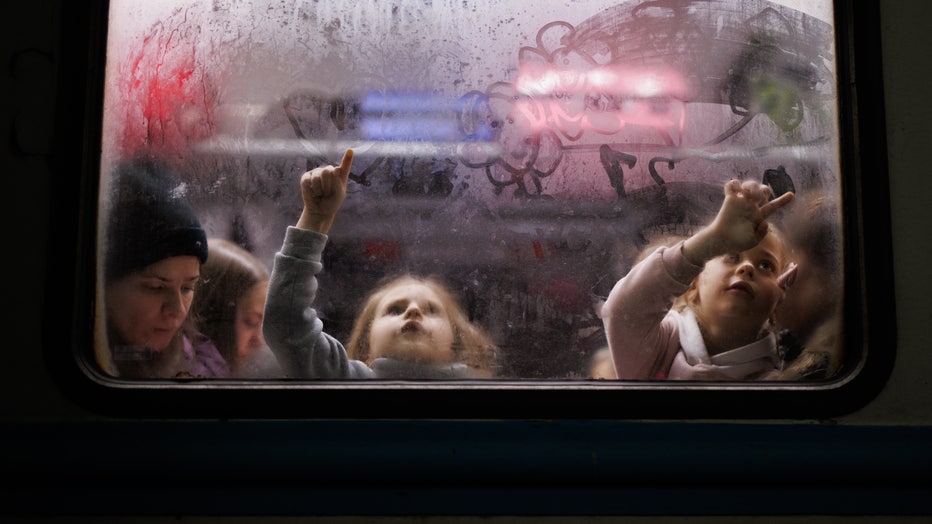Russia-Ukraine War: Biden administration offers humanitarian relief to Ukrainians
KYIV, Ukraine - Russian forces pressed their war Thursday on Ukraine, shelling a nuclear power station even as the two sides negotiated safe corridors to safely evacuate citizens.
In a video address to the nation, Ukrainian President Volodymyr Zelenskyy called on Ukrainians to keep up their resistance as the war raged on for an eighth day.
Here’s a look at key things to know about the conflict:
Biden admin sending humanitarian aid to Ukraine
The Biden administration offered humanitarian relief to Ukrainians in the United States on Thursday, which could protect thousands from being deported to their war-torn homeland.
Ukrainians can remain in the country for up to 18 months under the federal program known as Temporary Protected Status. In order to be eligible for the protection, individuals would have to have been in the U.S. since at least Tuesday.
The administration said the decision was made because of the Russian invasion into Ukraine, which marks the largest conventional military action in Europe since World War II. The invasion has caused a humanitarian crisis that has caused more than 1 million people to flee.
"Russia’s premeditated and unprovoked attack on Ukraine has resulted in an ongoing war, senseless violence" that has forced Ukrainians "to seek refuge in other countries," Homeland Security Secretary Alejandro N. Mayorkas said.
As many as 30,000 Ukrainians in the United States may benefit, according to the Migration Policy Institute, a nonpartisan think tank.
The nuclear power station
Russian troops have begun shelling the nuclear power station in Enerhodar, plant spokesman Andriy Tuz said.
"We demand that they stop the heavy weapons fire," Tuz said in a video posted on Telegram. "There is a real threat of nuclear danger in the biggest atomic energy station in Europe."
An official in Zelenskyy’s office said the reactors have not been damaged and radiation levels are normal. The official spoke on condition of anonymity due to not being authorized to speak publicly.
Zelenskyy said he has informed the leaders of the United States, Britain, EU and the International Atomic Energy Agency about the possibility of nuclear disaster.
"If there is an explosion – that’s the end for everyone. The end for Europe. The evacuation of Europe," he said in an emotional speech in the middle of the night.
The southern city of Enerhodar is a major energy hub on the Dnieper River. The Zaporizhzhia nuclear plant provides about 25% of Ukraine’s power generation and is the biggest in Europe.
How are negotiations going?
A member of Ukraine's delegation sent to speak with the Russians said both sides have agreed to establish corridors for civilians to safely leave combat zones. The corridors will include cease-fires along the path, said Mykhailo Podolyak, an adviser to Zelenskyy.
Humanitarian supplies could be delivered though the corridors, which were the Ukrainians' main demand heading into their second round of negotiations Thursday in Belarus, in the Brest region that borders Poland.
Russian President Vladimir Putin also announced the safe zones. Russian Foreign Minister Sergey Lavrov told reporters ahead of the meeting Russia would press its military action until achieving its goals, chiefly the "demilitarization of Ukraine," but added it will be up to Ukrainians to choose what government they should have.
Ukraine also sought an armistice in the negotiations, Podolyak said in a tweet with a picture of the negotiating table.
The third round of talks are planned for early next week, he said.
Leonid Slutsky, a senior Russian lawmaker who took part in the negotiations, said the next round could lead to agreements, some of which would need to be ratified by Russian and Ukrainian parliaments.
Meanwhile, Zelenskyy challenged Putin to sit down with him for talks.
"Any words are more important than shots," Zelenskyy said.
Safe zones for evacuees
A member of Ukraine's delegation sent to speak with the Russians said both sides have agreed to establish corridors for civilians to safely leave combat zones. The corridors will include cease-fires along the path, said Mykhailo Podolyak, an adviser to Zelenskyy.
Humanitarian supplies could be delivered though the corridors, which were the Ukrainians' main demand heading into their second round of negotiations Thursday in Belarus, in the Brest region that borders Poland.
Russian President Vladimir Putin also announced the safe zones. His country's Foreign Minister, Sergey Lavrov, had told reporters ahead of the meeting Russia would press its military action until achieving its goals, chiefly the "demilitarization of Ukraine," but added it will be up to Ukrainians to choose what government they should have.
Ukraine also sought an armistice in the negotiations, Podolyak said in a tweet with a picture of the negotiating table.
The third round of talks are planned for early next week, he said.
Leonid Slutsky, a senior Russian lawmaker who was a part of the negotiations, said the next round could lead to agreements, some of which would need to be ratified by Russian and Ukrainian parliaments.
Meanwhile, Zelenskyy challenged Putin to sit down with him for talks.
"Any words are more important than shots," Zelenskyy said.
The fight for southern Ukraine
The Russian military says it controls Kherson, and local Ukrainian officials have confirmed Russian forces have taken over local government headquarters in this Black Sea port of 280,000 people — the first major city to fall since the start of the war.
Russian troops had also reportedly entered the southern city of Enerhodar, a major energy hub on the Dnieper River that accounts for about one-quarter of Ukraine's power generation. It is the site of the Zaporizhzhia nuclear plant, the biggest in Europe. The mayor of Enerhodar said Ukrainian forces on the city’s edges are battling the Russian troops.
Heavy fighting is continuing on the outskirts of another strategic port city on the Azov Sea, Mariupol. The city's regional governor, Pavlo Kyrylenko, said Thursday night that power, water, heating and food deliveries to the city have been cut. He described the Russian siege as an "exemplary punishment" for the city.

A picture shows damages in a building entrance after the shelling by Russian forces of Constitution Square in Kharkiv, Ukraine's second-biggest city, on March 2, 2022. (Photo by SERGEY BOBOK/AFP via Getty Images)
Fighting elswhere
More shelling was reported in the northern city of Chernihiv, where officials said at least 33 civilians had been killed and 18 wounded in a Russian bombardment of a residential area. Rescue crews were forced to suspend their search in the wreckage because of renewed shelling.
Overnight explosions heard by Associated Press reporters in the capital, Kyiv, were missiles being shot down by Ukraine’s air defense systems, according to the city’s mayor. Russia’s 40-mile-long (64-kilometer-long) convoy of vehicles remains stalled outside Kyiv, which has been struck by deadly shelling.
Russian forces have also been bombarding the country’s second-biggest city, Kharkiv.
An aide to Zelenskyy has called on compatriots to use guerrilla tactics against Russian forces, cut down trees and destroy rear columns of Russian troops.
How many refugees?
The United Nations announced 1 million people have fled Ukraine since the assault started. This amounts to more than 2% of Ukraine’s population, though some of those fleeing Ukraine are citizens of other countries.
The U.N. refugee agency has predicted up to 4 million people could eventually leave Ukraine, a country with a population of 44 million.
The EU Commission says it will give temporary residence permits to refugees fleeing the violence and allow them to study and work in the 27-nation bloc. The move would need the approval of member states, which have expressed support.

A refugee girl carries a sibling after arriving at the Hungarian border town of Zahony on a train that has come from Ukraine on March 3, 2022 in Zahony, Hungary. (Photo by Christopher Furlong/Getty Images)
RELATED: Airbnb offering free housing for up to 100,000 Ukrainian refugees
War's death toll
Russia has acknowledged nearly 500 Russian troops have been killed so far and around 1,600 have been wounded. Ukraine has not released similar casualty figures for its armed forces.
The U.N. human rights office says at least 227 civilians have been killed and 525 wounded in Ukraine since the start of the invasion on Feb. 24. Ukraine’s State Emergency Service has said more than 2,000 civilians have died, though it's impossible to verify the claim.

People walk past a destroyed Russian military vehicle at a frontline position on March 03, 2022 in Irpin, Ukraine. (Photo by Chris McGrath/Getty Images)
RELATED: How sunflowers, Ukraine's national flower, became a symbol of solidarity and resistance
Russian general killed in Ukraine
Maj. Gen. Andrei Sukhovetsky, the commanding general of the Russian 7th Airborne Division, was killed in fighting in Ukraine earlier this week.
His death was confirmed by a local officers’ organization in the Krasnodar region in southern Russia. The circumstances of his death were not immediately clear.
Sukhovetsky, who was 47, took part in Russia’s military campaign in Syria. A funeral ceremony will be held in Novorossiisk, but further details weren’t immediately announced.

Two girls paint the foggy glass of one of the carriages at the Lviv train station, March 2, 2022, in Lviv, Ukraine. (Photo By Alejandro Martinez Velez/Europa Press via Getty Images)
RELATED: What is a thermobaric bomb?
Could Finland, Sweden join NATO?
Support for joining NATO has surged to record levels in Nordic neutrals Finland and Sweden.
A poll commissioned by Finnish broadcaster YLE this week showed for the first time more than 50% of Finns support joining the Western military alliance. In neighboring Sweden, a similar poll showed those in favor of NATO membership outnumber those against.
Moscow has warned it would be forced to take retaliatory measures if Finland and Sweden joined the alliance.

Russia's assault on Ukrainian cities continued, including Russia's disputed claim to have taken control of its first major city, Kherson, and a strike on Ukraine's second-largest city, Kharkiv, that led one official to call Kharkiv "the Stalingrad of the 21st century." Slavic Gospel Association is providing help to local churches that are aiding Ukrainians in the war zone.
How are sanctions impacting Russia?
The White House announced new sanctions Thursday aimed at people in Putin’s inner circle. Earlier this week, the U.S. announced sanctions against Russia and Belarus, including export controls aimed at Russia’s oil industry. The U.S. joined Europe and Canada in closing its airspace to Russian airlines.
A growing number of the world’s best known brands — from Apple to Mercedes-Benz and BP — are to pull out of Russia. German Volkswagen Group decided to halt its business activities in Russia, including that of subsidiary Skoda Auto, which is halting car production in its two Russian plants and all exports to Russia.
Similarly, Swedish furniture retailer Ikea says it's closing its operations in Russia, pausing all export and import in and out of Russia and Belarus, a decision that will have "a direct impact on 15,000 IKEA co-workers."

Russian President Vladimir Putin gave a national address on Thursday, falsely accusing Ukrainians of intentionally forcing Russia to wage war in populated areas including schools and residential buildings. Putin also referred to soldiers fighting against the Russian forces as "neo-Nazis" and falsely accused them of taking innocent people hostage.
What about the Russian people?
The sanctions threaten ultra-wealthy Russians who own properties across Europe and send their children to elite European private schools. Some have begun, albeit tentatively, to speak out.
French authorities said Thursday they seized a yacht linked to Igor Sechin, a Putin ally who runs Russian oil giant Rosneft, as part of EU sanctions over Russia’s invasion of Ukraine.
The U.S. State Department also said Thursday it was imposing visa bans on 19 Russian oligarchs and dozens of their family members and associates. The Justice Department previously announced a new initiative to go after Russian oligarchs.
Russian billionaire Roman Abramovich confirmed Wednesday he’s trying to sell the Premier League Chelsea soccer club, with a price tag of at least $2.5 billion floated. He said net proceeds from the sale will be donated to benefit victims of the war.
Ordinary Russians are also feeling the impact of the sanctions, from payment systems that won’t operate and problems withdrawing cash to not being able to purchase certain items.
Russian and Belarusian athletes are now banned from the Paralympics Games for their countries’ roles in the war in Ukraine when the Games open Friday.


